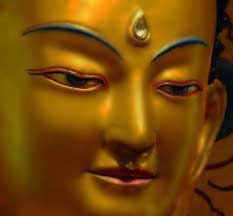Difference between revisions of "Rangtong"
Jump to navigation
Jump to search
(Redirected page to Shentong and Rangtong) |
|||
| Line 1: | Line 1: | ||
| − | + | [[File:100dfgh.jpg|thumb|250px|]] | |
| + | '''[[Rangtong]]''' ([[Wyl.]] ''[[rang stong]]'') literally means '[[empty]] of [[self]]' - The followers of the [[Rangtong]] [[Madhyamika]] approach say that all [[phenomena]], including the [[Buddha nature]], are [[empty]] of their own [[essence]]. They therefore disagree with the [[Shentong]] approach, which, they say, falls into the extreme of [[eternalism]]. | ||
| + | |||
| + | ==[[Criticism]]== | ||
| + | From the [[Shentong]] {{Wiki|perspective}}, the [[Rangtong]] [[view]] falls into the extreme of [[nihilism]]. The [[Shentongpas]] say that underlying everything there must be the uncompounded [[luminosity]] of the [[buddha nature]], as the basis for [[samsara]] and [[nirvana]] and all the qualities of [[enlightenment]]. | ||
| + | |||
| + | see also: [[Shentong and Rangtong]] | ||
| + | |||
| + | {{RigpaWiki}} | ||
| + | [[Category:Rangtong]] | ||
Revision as of 18:16, 26 April 2014
Rangtong (Wyl. rang stong) literally means 'empty of self' - The followers of the Rangtong Madhyamika approach say that all phenomena, including the Buddha nature, are empty of their own essence. They therefore disagree with the Shentong approach, which, they say, falls into the extreme of eternalism.
Criticism
From the Shentong perspective, the Rangtong view falls into the extreme of nihilism. The Shentongpas say that underlying everything there must be the uncompounded luminosity of the buddha nature, as the basis for samsara and nirvana and all the qualities of enlightenment.
see also: Shentong and Rangtong
